This is an ultimate guide to ukulele strings in which I covered all the required information you need to choose the right ukulele string set for your ukulele.
So, if you are confused about changing your ukulele stings then this guide will definitely help you with that.
In this guide, I will cover all types of ukulele strings, what should you look for in a set of ukulele strings, best ukulele brands and other useful information that help you to choose the right set for you.
So, without further ado, let’s start this guide.
First off,
Contents
5 Types of Ukulele Strings
There are 5 types of ukulele strings that exist in this world.
- Nylon
- Fluorocarbon
- Nylgut
- Wound strings
- Steel strings
All of them have their different characteristics and sound, and used for different purposes. Like, Nylon strings produce mild and warm tone which is great for folk and country music genre.
Disclosure: This post may contain affiliate links, which means we may receive a commission if you click a link and purchase something that we recommended. Read more about Affiliate disclosure here.
On the other hand, Sound and steel strings produce bright tone like guitar which obviously sustain a while after playing.
So these are best for rock and pop genre.
Let me explain all the ukulele string types one by one.
Nylon Ukulele Strings
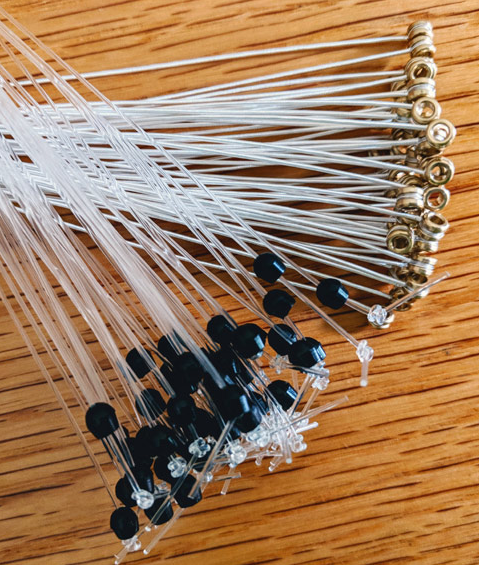
Nylon strings are made from nylon monofilament or nylon multifilament, which is a synthetic polymer material. So, sometimes it is addressed to “plastic strings”, however, it’s not a plastic material.
Nylon strings are used in both ukulele and nylon guitars. This string type produces warm, mellow tone and feels soft on fingers while playing.
The main purpose of using this string material on ukuleles because it does not apply more tension on the neck like steel strings.
As you know most ukuleles do not have truss rods, especially concert and soprano ukuleles, hence we need a string set that should not apply more tension on the neck otherwise there is a chance of bending the neck.
Nylon string fits well for this purpose.
But, there are some disadvantages to using nylon strings.
Such as,
- Nylon strings break often
- The sound is mild and mellow
- They do not produce sustain like steel strings
- They detune often so you have to retune them before every session
Fluorocarbon Ukulele Strings
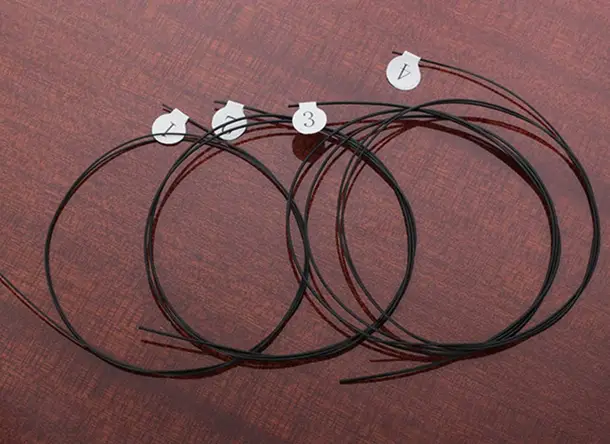
Fluorocarbon strings are made from a synthetic polymer called fluorocarbon. This string type is the second most popular among ukulele players.
It produces a bright and clear tone and hold the tuning for a long time.
That’s why it is quite popular among rock and contemporary musicians.
Fluorocarbon string offers several advantages over other string types.
Such as,
- Fluorocarbon produces bright and clear tone.
- This material helps to maintain good intonation over the fretboard.
- Its lower stretch factor allows it to respond fast compared to nylon.
- As it’s made from synthetic polymer, obviously it’s durable.
Along with the above advantages, Fluorocarbon strings come in different gauges. So, that are obviously more choices in Fluorocarbon strings compared to other types.
Nylgut Ukulele Strings
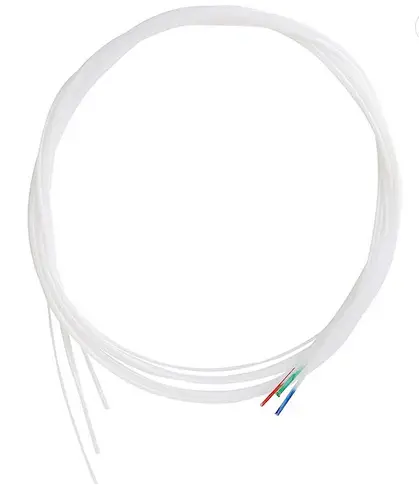
When the first ukulele was invented in Hawaii, the strings were made of animal gut because the animal intestine has the ability to hold the tension for a long time.
However, with time Nylgut became more popular which is a type of synthetic string designed to mimic the sound and feel of traditional gut strings.
It was easily accessible compared to animal gut strings hence became quite popular after introducing to the market.
Nylgut was developed by an Italian company “Aquila Corde Armoniche” in early 2000s.
Actually, animal gut strings had several disadvantages such as high cost, sensitivity to humidity and temperature, and not being easily accessible.
That’s why, Aquila Corde Armoniche created a synthetic alternative of the gut that reproduces the sound qualities of gut strings without getting affected by humidity and temperature.
However, it’s even not as affordable as nylon strings, if you want the same feel and sound of animal gut, you can use this type of string on your ukulele.
Wound Ukulele Strings
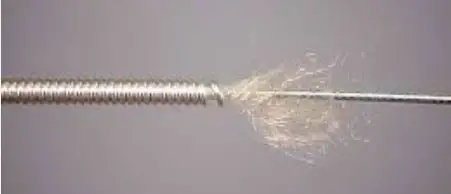
Ukulele wound strings are just like the lower strings of an acoustic guitar (If you’ve noticed).
In this string type, a metal wire is wrapped around a core material to give it strength and unique tonal quality.
These strings are used on lower-pitched ukuleles, such as baritone and tenor types in which a truss rod is given to prevent the neck from bending if these types of strings are used.
Wound ukulele strings produce a richer and deeper tone like a guitar.
There are multiple materials used to build wound strings such as nylon, fluorocarbon, or a combination of materials.
Wound ukulele strings have several advantages,
such as,
- The wounded material allows it to produce an enhanced resonance and sustain.
- Wound ukulele strings produce a rich and warm tone.
- Wound allows the string to produce fuller sound with depth.
There are some disadvantages of these strings such as the oxidation of wounded material and wear which directly affect the string’s tone over time.
Steel Ukulele Strings
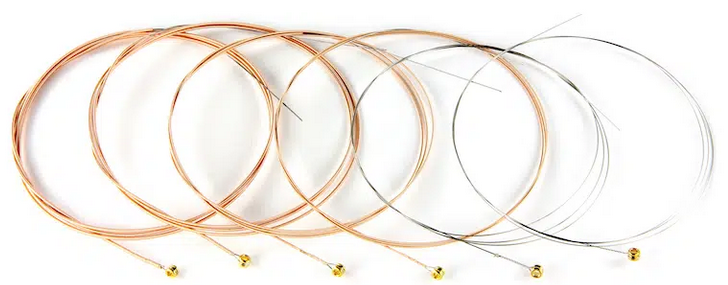
Steel strings are primarily used in guitar, banjo and some other stringed instruments, however, its also used in ukuleles.
But you need a ukulele with truss rod to get rid of the bending of the neck due to tension.
If you want to change your taste on the ukulele then you can use steel strings which will give you a different sound and playing experience.
Steel strings produce a bright and articulate tone so if you love this type of tone then steel strings are best.
These strings also increase the sustain and intensity of sound compared to nylon or fluorocarbon strings.
You will get a different feel while playing a ukulele equipped with steel strings. Steel strings have a higher tension and a different tactile response under your fingers which you might know if you play guitar.
If you love more tension under your finger then steel strings are best for you.
However, there are some disadvantages to using steel strings on ukulele, especially ukulele without a truss rod.
Ukuleles are not built for steel strings so they cannot handle the increased tension of steel strings.
Steel strings exert more force on the ukulele’s bridge and top which leads to potential damage.
What Should You Look for in a Set of Ukulele Strings?
When purchasing ukulele strings, you should look for some criteria that the string set should fulfill.
In this section, I will describe the criteria to choose a ukulele string set for your ukulele.
So, let’s dive in.
First off,
String Length
First, you should look for the ukulele to which you want to change the strings. Whether it’s a Concert ukulele, Soprano ukulele, Baritone ukulele, or Tenor ukulele.
The length of the string set depends on the type of ukulele. If you don’t know about all the types of ukuleles then you should read this blogpost, “Which Ukulele Should I Buy As a Beginner” in which I have described all ukulele types.
For now, you just have to know that all ukulele types are of different sizes, such as, Soprano ukulele is 21 inches long while Concert ukulele is 23 inches long.
So, obviously, they require different string lengths.
You will get all the information about the string on the packet which should also include the length.
String Material
I have described above all the ukulele string types with the build materials and also their advantages and disadvantages.
You can get help from the above to choose the right string type for your ukulele.
For me, Nylon and Fluorocarbon ukulele strings do better compared to others. For you, maybe some other materials do good.
It all depends on your taste and ease of use when choosing the ukulele string material.
Low G vs High G Sets
When it comes to ukulele strings, Low G and High G term are a bit confusing.
Actually, it comes from the tuning of 4th string (G string) relative to the other strings.
Low G string set means 4th string is tuned to one octave below to the 3rd string. High G set means the 4th string is tuned to the same octave as the 3rd string.
Both tunings need different gauge strings that’s why there are two sets available in the market in the name of Low G and High G ukulele string sets.
Before choosing any of them you should know how they affect the sound and playability of your ukulele.
A Log G set adds depth and richness to the overall sound. It’s more common in genres like jazz, blues, and fingerstyle playing.
Low G set comes with a wound string as a low G because a thicker string is needed to tune one octave below.
High G is the standard tuning of a ukulele. This tuning produces a bright and cheerful tone that connects to the traditional tone of a ukulele.
High G is best for traditional Hawaiian music, pop, and folk genres.
High G set comes with a non-wound thin string for the high G.
So, you can choose the right “String Set” according to your play style and taste of sound.
Do You Need Metal Winding on the Lower Strings?
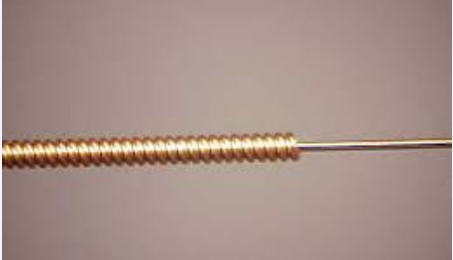
As I have mentioned above, Low G set comes with a wound string that is winded with nylon or metal.
So, it is essential, if you go with Low G string set. But, if you go with High G set, there is no need of metal winding on the lower string.
For the Baritone and Tenor ukuleles, the 3 lower strings are generally metal or nylon winded.
So, it also depends on the ukulele you have. If you have a concert or soprano ukulele, there is no need to use wound strings.
8 Best Ukulele Strings
Here are the 8 best ukulele strings that you can buy online.
1. Aquila Nylgut
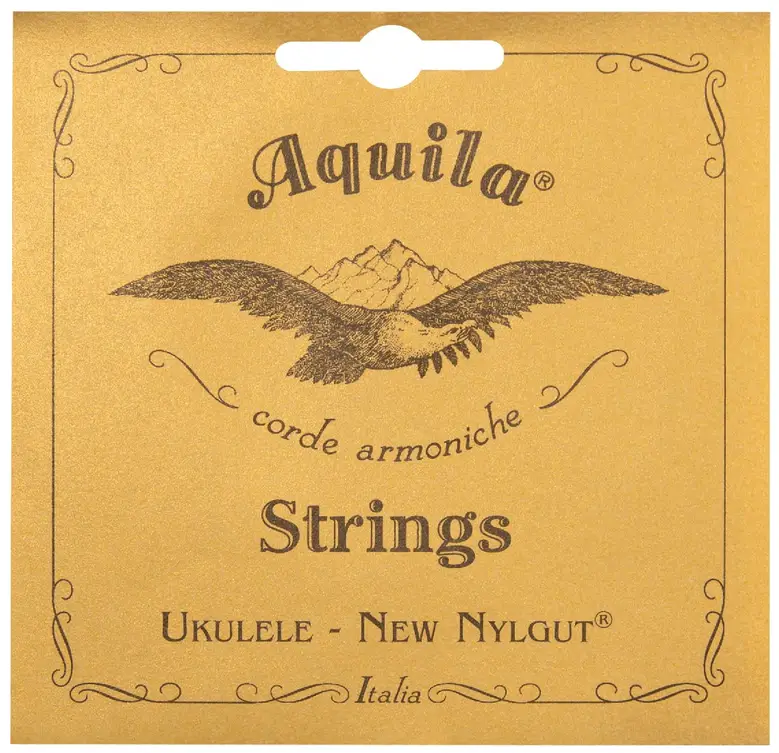
- Material: Nylgut
- Brand: Aquila
- Scale: High G
- Ukulele Type: Tenor
2. GHS H-T10 Hawaiian Ukulele Strings
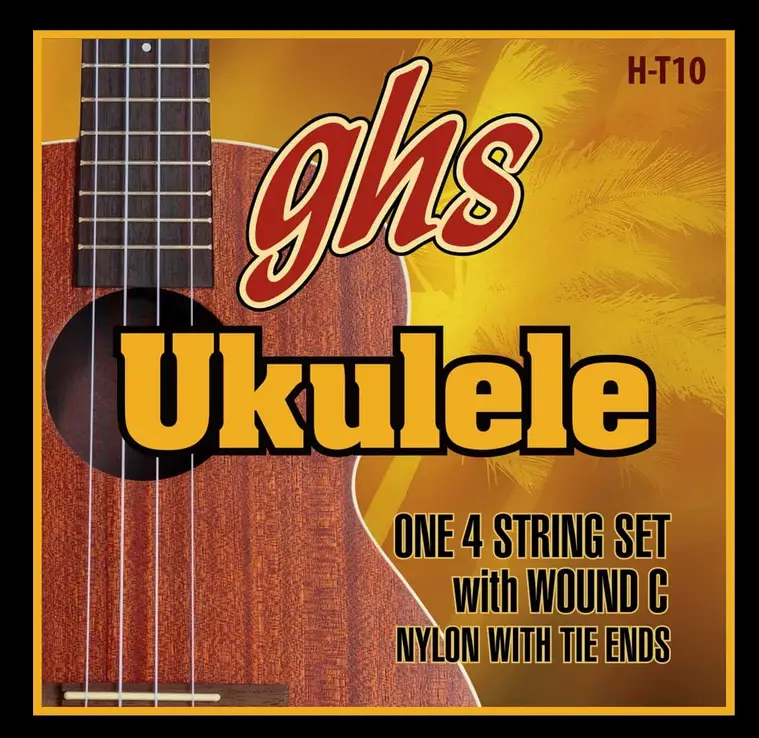
- Material: Nylon + Aluminium third
- Brand: GHS
- Scale: High G
- Ukulele Type: Soprano and Concert
3. Ernie Ball 2329 Ukulele Strings
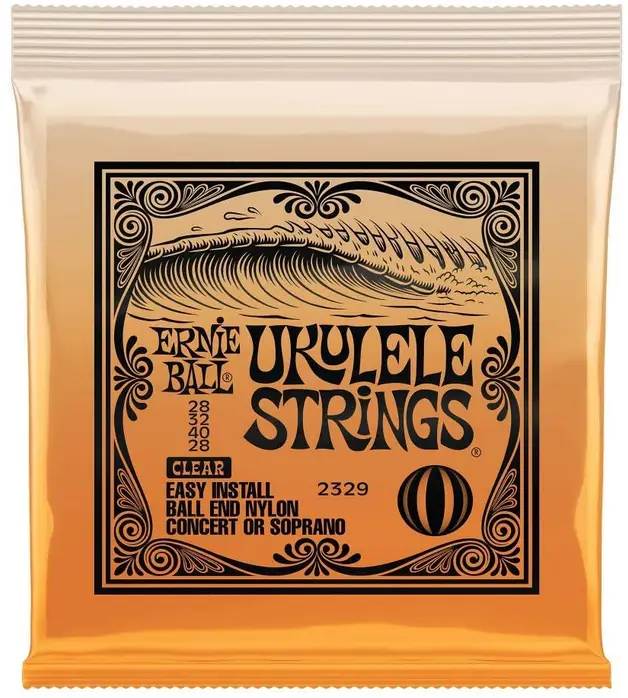
- Material: Nylon
- Brand: Ernie
- Scale: Low G and High G
- Ukulele Type: Soprano and Concert
4. Martin M600 Ukulele Strings
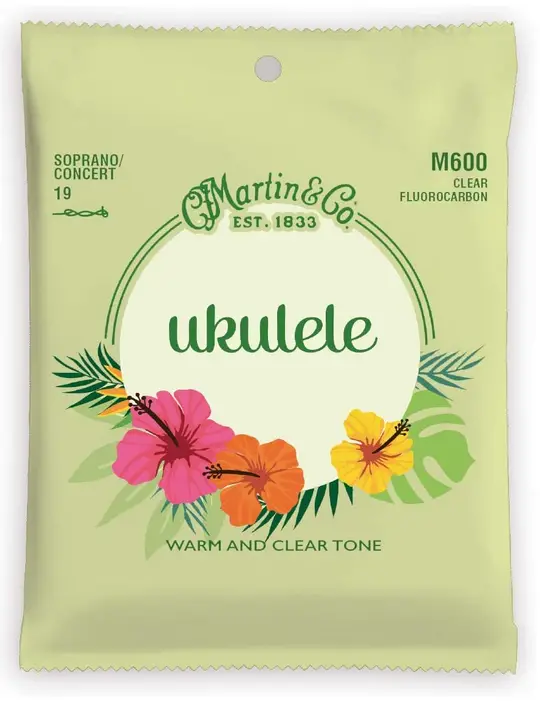
- Material: Nylon
- Brand: Martin
- Scale: Low G and High G
- Ukulele Type: Soprano, Concert, Tenor and Baritone
5. Worth CM Clear
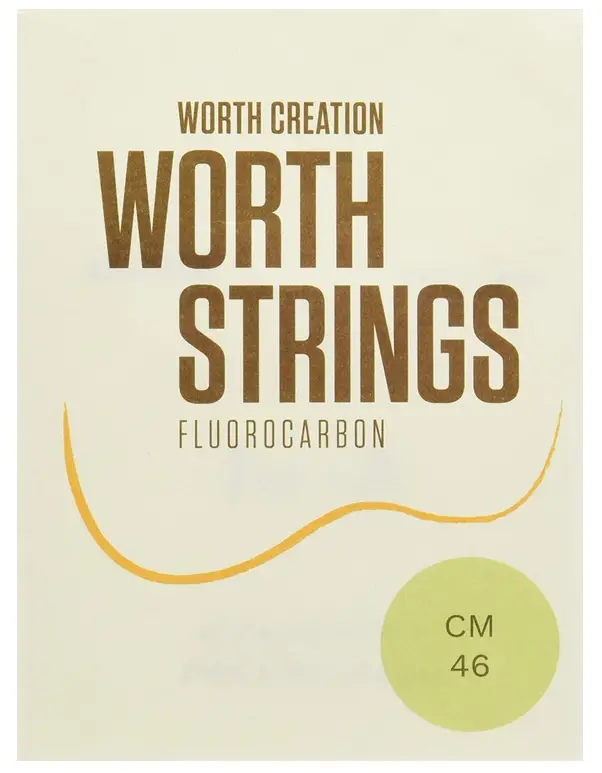
- Material: Fluorocarbon
- Brand: Worth
- Scale: Low G and High G
- Ukulele Type: Soprano, Concert, Tenor and Baritone
6. Chengu Nylon Ukulele Strings
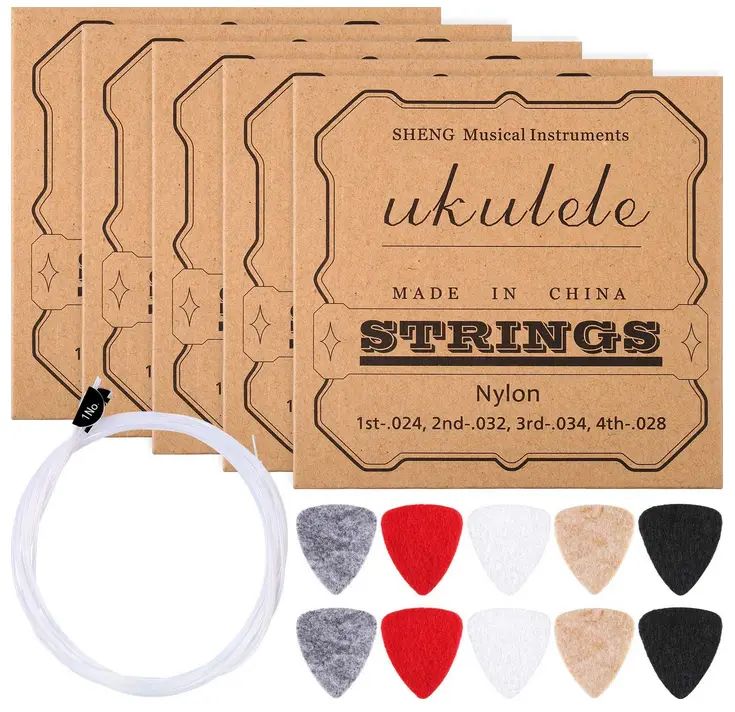
- Material: Nylon
- Brand: Chengu
- Scale: Low G and High G
- Ukulele Type: Soprano, Concert, Tenor and Baritone
7. Aquila Red Series AQ-86
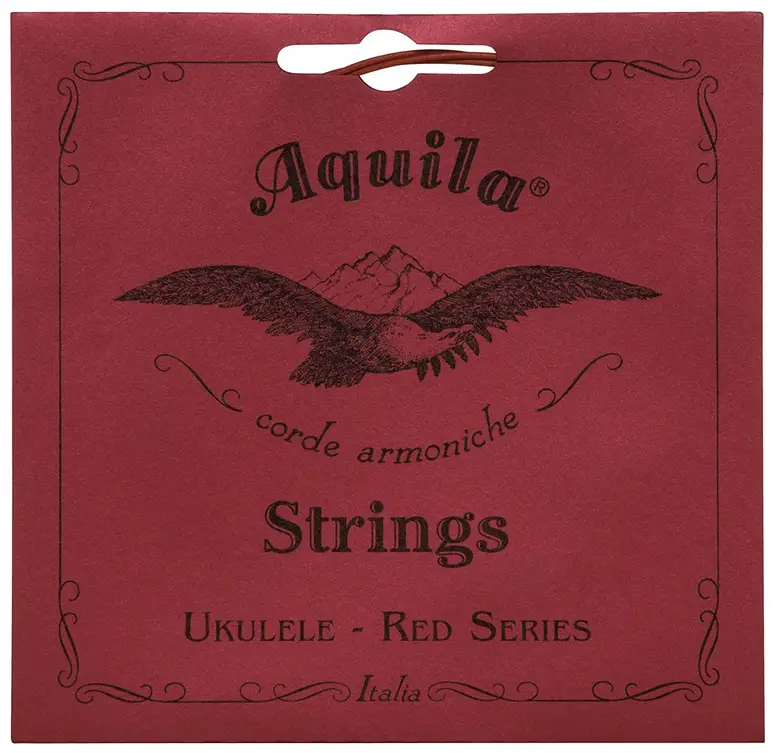
- Material: Nylon
- Brand: Aquila
- Scale: Low G and High G
- Ukulele Type: Soprano, Concert, Tenor and Baritone
8. D’Addario EJ87S Titanium Ukulele Strings
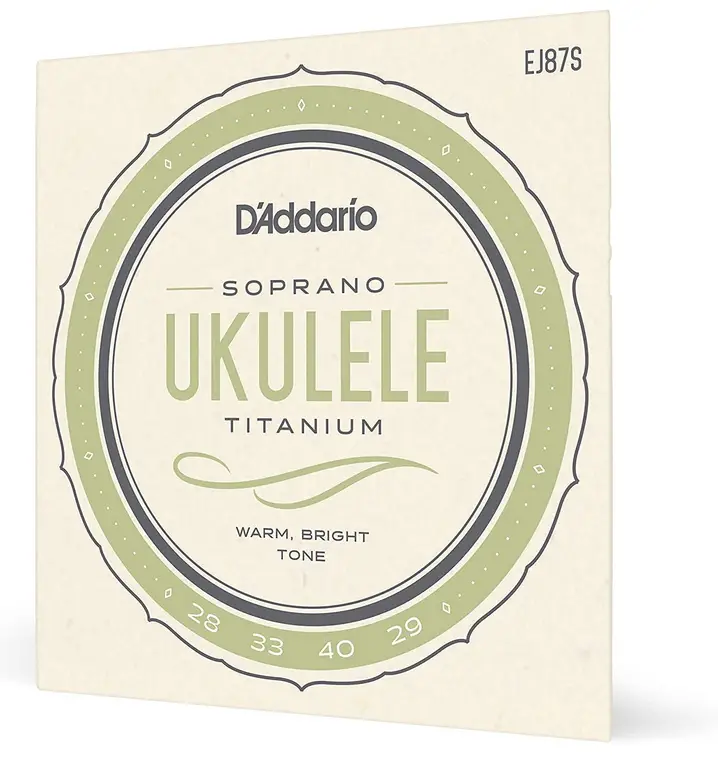
- Material: Nylon, Titanium,
- Brand: D’Addario
- Scale: Low G and High G
- Ukulele Type: Soprano, Concert, Tenor and Baritone
How to Choose the Right String Gauge?
Ukulele strings come in three type of gauges.
- Light gauge
- Medium gauge
- Heavy gauge
Every gauge provides its exclusive features such as tonal quality, playability etc.
Light gauge strings produce bright and cheerful sounds. Medium gauge strings produce a warmer and more rounded tone. Heavy gauge strings produce a mild and deep tone.
So, it all depends on the tonal quality that you want in your playing when choosing the string gauge.
But, you should also keep some things in mind before choosing the string gauge.
Such as,
- Always consider neck and nut width as wider necks can accommodate thicker strings than narrow necks.
- You should also consider the scale length of the ukulele. Longer scale lengths require heavier gauge strings the short necks.
How Long Do Ukulele Strings Last?
The lifespan of your ukulele strings depends on several factors such as,
- Playing Frequency: The life of your ukulele strings always depends on your playing frequency. The more you play your ukulele the less lifespan of the strings.
- Playing style: Aggressive strumming and finger-picking can put more stress on the strings and cause them to wear out faster.
- String type: Nylon or Fluorocarbon strings have a shorter lifespan compared to steel strings.
- Environmental conditions: Finally, environmental conditions also affect the lifespan of the strings. Harsh environments like humidity, temperature, and exposure to dirt and oils shorten the lifespan of your ukulele strings.
Summing Up
Choosing the ukulele strings is really confusing when there are countless options available on the market. But, I think this guide helped you to choose your next ukulele string set without any confusion.
Well, the type, size, material, etc directly affect the quality, sound, and lifespan of the strings.
So, you should always consider all these things before buying ukulele strings.
Let me know in the comments if you have any queries about ukulele strings.
Happy ukulele playing.
Related,
